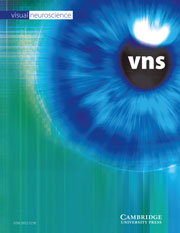Crossref Citations
This article has been cited by the following publications. This list is generated based on data provided by
Crossref.
Serra, E.L.
Medalha, C.C.
and
Mattioli, R.
1999.
Natural preference of zebrafish (Danio rerio) for a dark environment.
Brazilian Journal of Medical and Biological Research,
Vol. 32,
Issue. 12,
p.
1551.
Manglapus, Mary K.
Iuvone, P. Michael
Underwood, Herbert
Pierce, Mary E.
and
Barlow, Robert B.
1999.
Dopamine Mediates Circadian Rhythms of Rod–Cone Dominance in the Japanese Quail Retina.
The Journal of Neuroscience,
Vol. 19,
Issue. 10,
p.
4132.
Dowling, John E.
1999.
Handbook of Molecular-Genetic Techniques for Brain and Behavior Research.
Vol. 13,
Issue. ,
p.
177.
Li, Lei
and
Dowling, John E.
2000.
Effects of Dopamine Depletion on Visual Sensitivity of Zebrafish.
The Journal of Neuroscience,
Vol. 20,
Issue. 5,
p.
1893.
Li, Lei
and
Dowling, John E.
2000.
Disruption of the Olfactoretinal Centrifugal Pathway May Relate to the Visual System Defect innight blindness bMutant Zebrafish.
The Journal of Neuroscience,
Vol. 20,
Issue. 5,
p.
1883.
Barlow, Robert
2001.
Concepts and Challenges in Retinal Biology (Progress in Brain Research).
Vol. 131,
Issue. ,
p.
487.
Saszik, Shannon
and
Bilotta, Joseph
2001.
Constant dark‐rearing effects on visual adaptation of the zebrafish ERG.
International Journal of Developmental Neuroscience,
Vol. 19,
Issue. 7,
p.
611.
Larkin, Patrick
and
Semple-Rowland, Susan L.
2001.
A null mutation in guanylate cyclase-1 alters the temporal dynamics and light entrainment properties of the iodopsin rhythm in cone photoreceptor cells.
Molecular Brain Research,
Vol. 92,
Issue. 1-2,
p.
49.
Li, Lei
2001.
Zebrafish mutants: Behavioral genetic studies of visual system defects.
Developmental Dynamics,
Vol. 221,
Issue. 4,
p.
365.
Bilotta, Joseph
and
Saszik, Shannon
2001.
The zebrafish as a model visual system.
International Journal of Developmental Neuroscience,
Vol. 19,
Issue. 7,
p.
621.
Savchenko, Alexei
Kraft, Timothy W.
Molokanova, Elena
and
Kramer, Richard H.
2001.
Growth factors regulate phototransduction in retinal rods by modulating cyclic nucleotide-gated channels through dephosphorylation of a specific tyrosine residue.
Proceedings of the National Academy of Sciences,
Vol. 98,
Issue. 10,
p.
5880.
Li, Lei
2001.
Concepts and Challenges in Retinal Biology (Progress in Brain Research).
Vol. 131,
Issue. ,
p.
555.
Mangel, Stuart C.
2001.
Concepts and Challenges in Retinal Biology (Progress in Brain Research).
Vol. 131,
Issue. ,
p.
505.
Miranda-Anaya, Manuel
Bartell, Paul A.
and
Menaker, Michael
2002.
Circadian Rhythm of Iguana Electroretinogram: The Role of Dopamine and Melatonin.
Journal of Biological Rhythms,
Vol. 17,
Issue. 6,
p.
526.
Ren, Jason Q
McCarthy, William R
Zhang, Hongwei
Adolph, Alan R
and
Li, Lei
2002.
Behavioral visual responses of wild-type and hypopigmented zebrafish.
Vision Research,
Vol. 42,
Issue. 3,
p.
293.
Cahill, G. M.
2002.
Biological Rhythms.
p.
120.
Bilotta, Joseph
Saszik, Shannon
Givin, Carla M
Hardesty, Heather R
and
Sutherland, Sarah E
2002.
Effects of embryonic exposure to ethanol on zebrafish visual function.
Neurotoxicology and Teratology,
Vol. 24,
Issue. 6,
p.
759.
Briggs, Josephine P.
2002.
The zebrafish: a new model organism for integrative physiology.
American Journal of Physiology-Regulatory, Integrative and Comparative Physiology,
Vol. 282,
Issue. 1,
p.
R3.
Maaswinkel, Hans
and
Li, Lei
2003.
Olfactory input increases visual sensitivity in zebrafish: a possible function for the terminal nerve and dopaminergic interplexiform cells.
Journal of Experimental Biology,
Vol. 206,
Issue. 13,
p.
2201.
MIN, HONGTAO
2003.
THE ESSENCE OF CIRCADIAN RHYTHMS.
Journal of Biological Systems,
Vol. 11,
Issue. 01,
p.
85.


